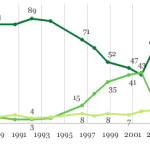 One of the biggest problems in embracing a more positive view of the world is what is known in psychology as negativity bias. Human beings — indeed all living things — are wired by evolution to be on guard against danger. Relaxing and enjoying life is not exactly part of the evolutionary program. It is the anxious and vigilant among us that are more likely to notice the rustling in the bushes that may be a saber tooth tiger, even when it is statistically much more likely to be a rabbit. Of course on the off-chance that it is a tiger, the vigilant take action to fight, flee or hide, and are more likely to live to see another day and have more babies to pass their nervous, negative genes on to.
One of the biggest problems in embracing a more positive view of the world is what is known in psychology as negativity bias. Human beings — indeed all living things — are wired by evolution to be on guard against danger. Relaxing and enjoying life is not exactly part of the evolutionary program. It is the anxious and vigilant among us that are more likely to notice the rustling in the bushes that may be a saber tooth tiger, even when it is statistically much more likely to be a rabbit. Of course on the off-chance that it is a tiger, the vigilant take action to fight, flee or hide, and are more likely to live to see another day and have more babies to pass their nervous, negative genes on to.
This phenomena is generalized to color our view of the world at large, creating what the researcher George Gerbner called the mean world syndrome, a sense that life is more dangerous that it actually is. We hear it all the time, a general consensus in the media and everyday conversation that we are living in a uniquely dangerous or debased age. Compared to what? Yes, it is still a dangerous world. But by almost any measure more people are living better lives that at any time in history.
Here are a couple articles I’ve run into recently that fly in the face of our negative consensus reality:
Cancer death rates drop 20 percent in two decades







Absolutely important to know that we have inherited a fear and attention response like the Negativity Bias. All our best efforts to créate a noble, brotherly world bump into this evolutionarily programmed predisposition. If there’s going to be an “integral age” as we remain human and our humanity is not diminished by cibernetic implants or something of this sort, there may be 2 options: Learning how to psychologically transcend and include this (and other similar biases) and-or for our brains to naturally evolve in accord with the rise of an Integral Civilization. I mean, if all quadrants co-arise then our brains and gene expressions would also change in parallel with culture, systems and our intended subjectivity and understandings.
Those articles reference the USA. Americans have always had a positive bias compared to the more “realistic” view of life by European’s. Empires rise and fall. Good and evil co-exist as they mutually define each other. (See KW in new boundaries). Etc.
How about the rest of the world? Could calling this fear of bad things happening a “bias” be itself a bias ? That we celebrate the good, the beautiful and the true and keep hopeful, creative and growing does not negate being alert to danger, open to the perhaps subtle evil in us, and remain cognizant that America is not the world.